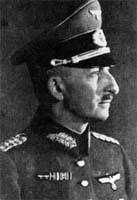Hans von Arnim

Hans von Arnim was born in Ernsdorf, Germany on 4th April 1889. He joined the German Army in 1907 and during the First World War fought on the Western Front and the Eastern Front.
He remained in the army and spent a year in the Defence Ministry (1924-25) before taking command of the elite 68th Infantry Regiment in Berlin. In January 1938 he was promoted to the rank of major general and was sent to head the Army Service Department in Silesia.
On the outbreak of the Second World War Arnim was placed in command of the 52th Infantry Division. He took part in the invasion of Poland and France. Promoted to the rank of lieutenant general he served under General Heinz Guderian during Operation Barbarossa. However, he was serious wounded at Stolpce on 24th June 1941. After making a full recovery he took part in the encirclement of Kiev and the capture of Bryansk.
In November 1942, Arnim was promoted to general and placed in command of the 5th Panzer Army in Tunisia. After General Erwin Rommel left in March 1943, Arnim became head of the German Army in Africa but was unable to halt the Allied advance and on 11th May, 1943, the Axis forces surrendered Tunisia. The following day Arnim was captured by the Allies.
The second highest-ranking German prisoner of war (after Rudolf Hess), he was held in Britain until 1947. Hans von Arnim returned to Germany where he lived until his death on 1st September 1962.
Primary Sources
(1) General Harold Alexander wrote about the capture of Hans von Arnim in his autobiography, Memoirs: 1940-1945 (1961)
My opponent was General von Arnim, and as a prisoner on his way back to General Eisenhower's H.Q. he stayed the night at my field headquarters at Le Kef. I didn't invite him to dine with me - I didn't feel the gesture to be necessary; but I had a special tent and a little mess set up for him so that he could be looked after comfortably and in a manner I considered right and proper of a man in his position. He was, in fact, entertained in the same style as any other guest I might have had, but he was alone with his A.D.C. When he arrived I had a short interview with him, but I didn't ask him for any information or embarrass him in any way interrogation could come later.
Von Arnim I found to be a fine, old-fashioned type of German general of distinguished family, an officer who was a gentleman and who had belonged to the 4 Garde Regiment zu Fuss-the same number as my own regiment, the Irish Guards, or 4 Regiment of Foot Guards - in the Kaiser's day. During our short conversation I felt that he was expecting me to say what a splendid fight he and his men had put up, but I'm afraid I disappointed him - we hadn't yet won the war. However, looking back I think it would have been a little more generous of me if I had been more chivalrous.
